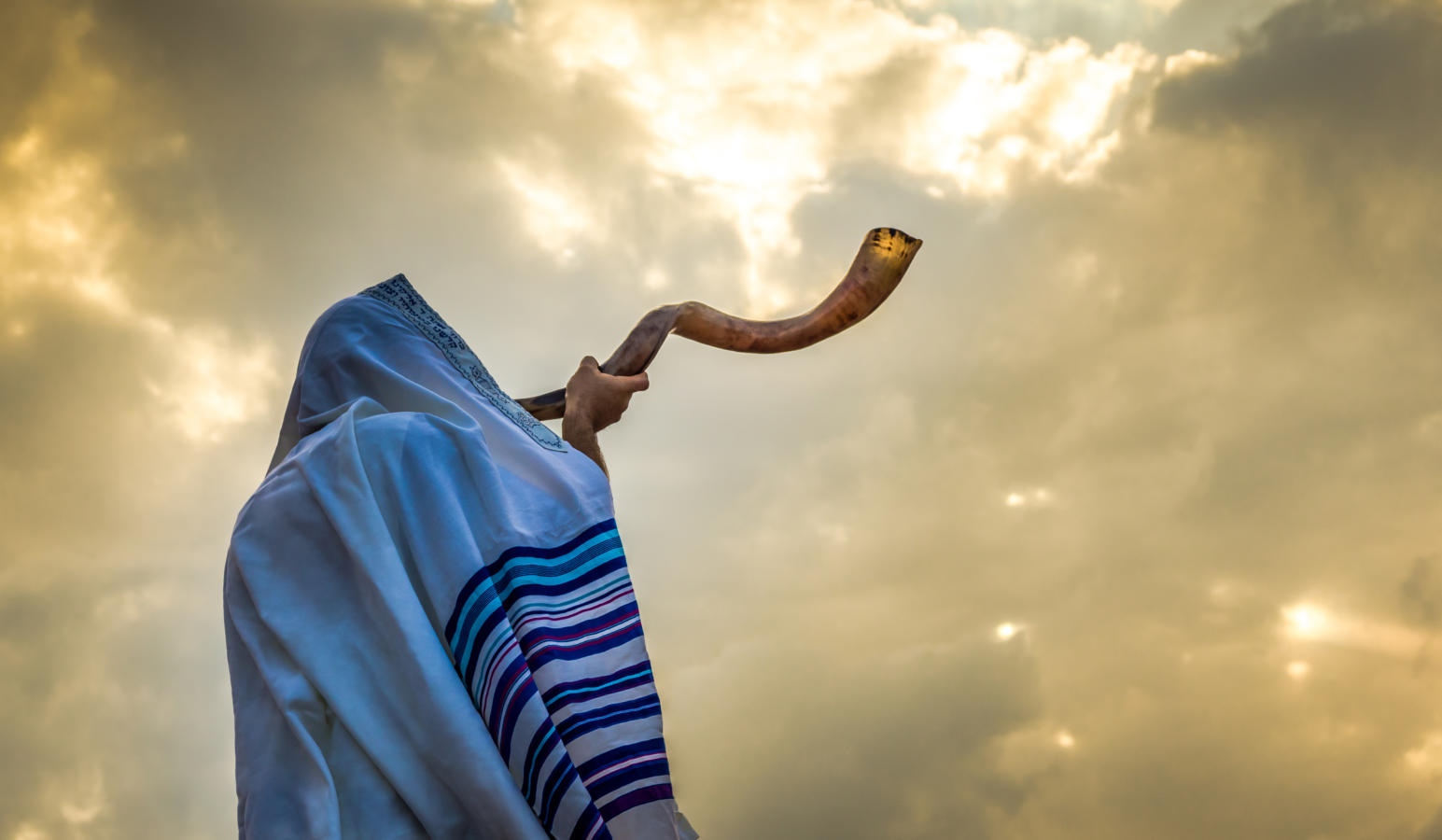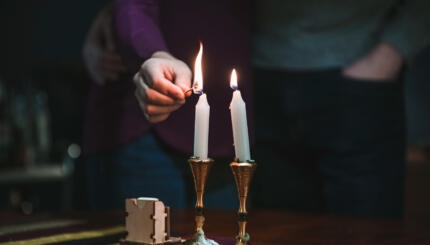Praying With Our Breath
On we pray in the purest form for spiritual guidance and understanding. We want to choose a life based on the needs of our spiritual well-being. We no longer want to go astray with lust and desire for the impermanent.
Normally, during the entire year, we pray for our physical needs. Then we pray with our physical being: our throat, tongue, teeth, and lips. But on Rosh Hashanah we use only our breath, our spiritual essence, and blow into the .
The shofar sound is our Rosh Hashanah prayer to God: “May this year be one in which we seek the path of spiritual benefit, and not purely physical lusts.”
Sounds of the Shofar
There are three types of sounds we blow with the shofar: a tekiah, a steady blast; a shevarim, a broken note; and a teruah, a shattered quavering note. They symbolize our prayers on Rosh Hashanah.

Help us keep Jewish knowledge accessible to millions of people around the world.
Your donation to My Jewish Learning fuels endless journeys of Jewish discovery. With your help, My Jewish Learning can continue to provide nonstop opportunities for learning, connection and growth.
During the year when we pray, we approach our creator directly, as we do in the Amidah, the silent prayer, which originally consisted of 18 separate prayers. We stand before God in awe, fear, and trembling, and we bow and sing His praises. Then we cry, plead, and beg, as creatures, for our life and sustenance. We then exit from our encounter with praise and honor to God.
On Rosh Hashanah we pray with the shofar. The steady blast of the shofar, tekiah, signifies our direct approach to God. We need not travel, but are immediately before Him. We thus realize that we are His creatures, impotent, broken, and shattered. These are the sounds of the shevorim and the teruah. They are expressed, not in words, but in sounds that bellow forth from our inner being and essence as creatures. Once we have made this intimate encounter, we exit and praise God with another steady blast. There are a total of three short notes and nine shattered notes, corresponding to the 12 prayers of the Amidah dealing with life and sustenance.
Let us open our heart on Rosh Hashanah to experience the true brokenness of our being and our exile as a people. Then God will answer with the steady blast of the shofar, signaling our total redemption.
Shofar of the Past
There will come a day when all the crooked will be straightened, all the valleys will be raised, and all the mountains will be lowered; God will reign supreme, and all will know that He is one. The World to Come will be ushered in with an infinite, piercing, steady sound of the shofar.
We have already heard this shofar sound, collectively, on Mount Sinai. There too it was revealed that God is our father and we are His children; He is our king and we obey Him as servants. On Rosh Hashanah, the sound of the shofar evokes in us the shofar sounds from the past and the future. Then we straighten our crookedness, humble our arrogance, and assume the role of a child, a prince in God’s kingdom.
Plea for Lovingkindness
It is written, “Praised is the nation that understands the quavering sound of the shofar” (Psalms 89:16).
The quavering sound of the shofar is the utter brokenness and impotence of all creatures before God the Creator. This is the truth of our being: We exist only by the grace of God’s purely unaffected will and mercy every instant. Thus, whoever understands his own brokenness also understands God’s will in its purest form. As it is written, “. . . and the trumpet blast of the king is in him” (Numbers 23:21).
The will of God is to do whatever He deems good for His creatures. This is the divine judgment: precise, exact, and unerring. It is understood by those who understand the teruah, their own brokenness as creatures. Still, we pray for mercy and loving-kindness on Rosh Hashanah. What more can we ask for?
We can compare this to a patient who was diagnosed as having a large brain tumor and chose a reputed surgeon to remove it. The surgeon informed the patient of all the details, consequences, and prognosis. Finally the day of surgery arrived. Although he believed the doctor would be precise, exact, and unerring, still the patient had tears in his eyes. “Please,” he pleaded, “I understand the operation fully. Just, I beg you, each time you cut, think of me and my life. Think of how I will feel it.”
Thus, although he was confident the operation would be done with pure judgment, still he begged for loving-kindness. We want God to take our life into account the way we experience the judgment. We want the good that God does to be also the good that we experience.
This idea is beautifully taught in the Talmud: “When the Jewish people blow the shofar on Rosh Hashanah, God rises from his throne of judgment and sits down on a throne of mercy” (Talmud, Rosh Hashanah 18a).
Hearing the Voice of Jacob
It is written, “They call and God listens” (Psalms 34:18). The midrash asks, “What is inherent in their call that guarantees the attention of God?”
The Jewish people are forever humbled before God with prayers and supplications. They recognize God as the Creator and assume the role of creatures. And since the Creator is always good to His creatures, He listens and answers their call.
The gift of heartfelt prayer we have inherited from our forefather Isaac. He blessed his son Jacob and said, “The voice is the voice of Jacob.” The voice belongs to him always in all generations to come. And when Jacob prays as a creature before his Creator, he needs no mercy. It is decreed by divine judgment that every creature shall receive sustenance. Thus, Jacob received his voice, and his sustenance, as an inheritance from his father Isaac, who represents the virtue of strict judgment.
This is like a kingdom in which all legal matters were judged by the king with the help of a panel of judges. On occasion, the king overruled the judges, saying, “I know the law, but this case, because it is pitiful, is an exception.” Once, the prince himself presented a legal matter before the judges. His father ruled in his favor, and the judges added, “In this case we rule that whoever is like the prince, so loyal and faithful, deserves what his father grants him.”
On Rosh Hashanah, as soon as we make our voice heard through the sound of the shofar, God had already listened.
Reprinted with permission from The Jewish Holy Days: Their Spiritual Significance (Jason Aronson).



